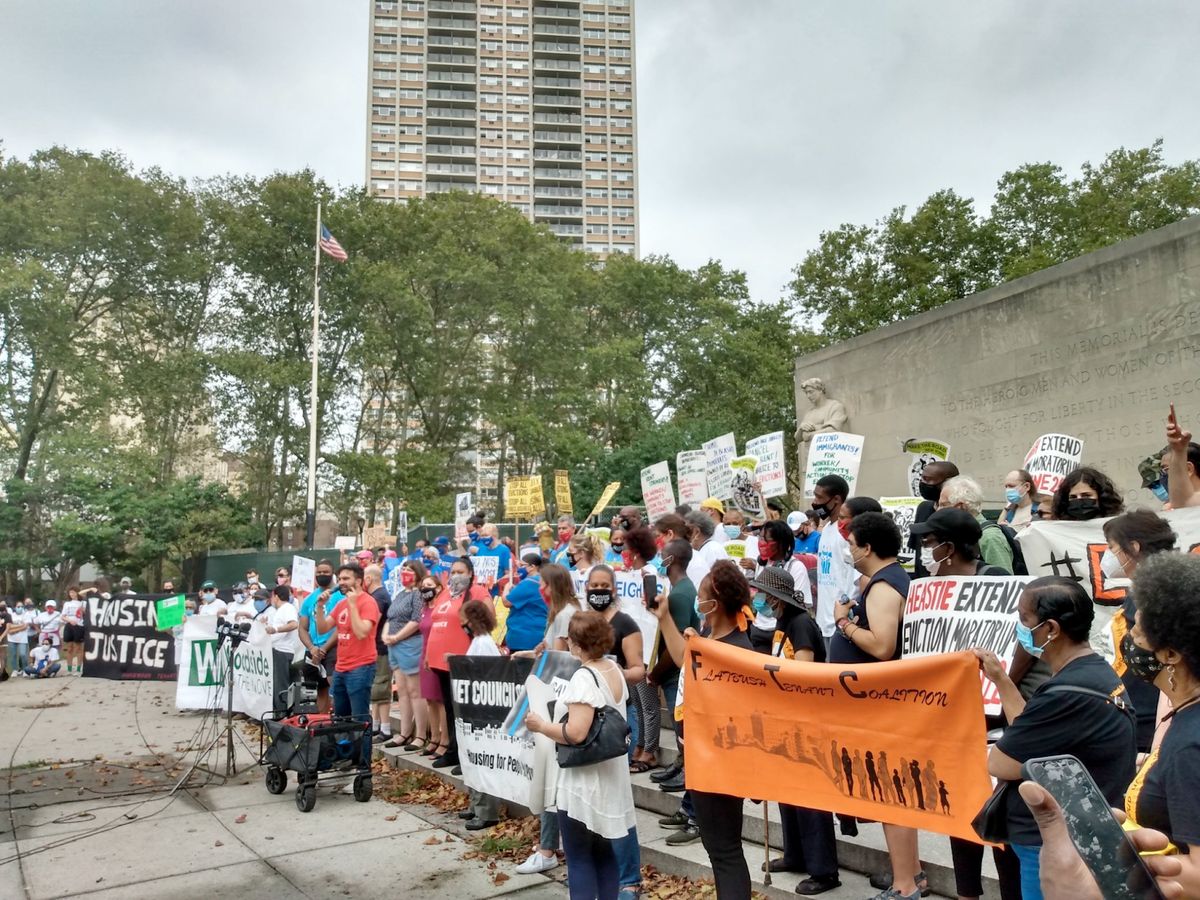Advocates and Electeds Rally for Renewed Eviction Moratorium After Supreme Court Ruling
Last week, the Supreme Court voted to block a key provision in the state’s eviction moratorium that allowed tenants to at least temporarily avoid housing court proceedings by signing a sworn declaration that they had experienced COVID-related financial hardship.

Hundreds of tenant advocates, elected officials and other New Yorkers gathered in Downtown Brooklyn Thursday morning to demand new protections for tenants a week after the US Supreme Court struck down part of New York’s eviction moratorium, potentially putting thousands of New Yorkers at risk of losing their homes.
At a rally that began at Cadman Plaza in Brooklyn, the group criticized the ruling by what they called a “right-wing” Supreme Court, and called on the state legislature to return to session to amend and extend the moratorium.
“We are here to make sure that the tenants have a voice,” said Brooklyn Assembly Member Marcela Mitaynes at the event. “That we’re uplifting those voices and that we’re representing them. And this is a message to the [Assembly Speaker Carl Heastie]. We need to get back to the Assembly. We need to do our work.”
Many of the attendees of the event, which was organized by a coalition of nonprofits and community groups under the banner Housing Justice For All, then marched through nearby Columbus Park, chanting slogans like “No landlords, no cops, all evictions have to stop.”
The message is clear today as members of @housing4allNY rally to demand NYS extend the eviction moratorium & fix the rental assistance program to ensure it is distributed to tenants ASAP.
— Make the Road NY 🦋 (@MaketheRoadNY) August 19, 2021
“No landlords, no cops, all evictions have to stop.” #EvictionFreeNY pic.twitter.com/6RFyKjvDh1
Others formed a blockade that stopped traffic near the intersection of Court and Remsen Streets that resulted in several arrests, including Mitaynes, Queens Assembly Member Zohran Mamdani and two Democratic nominees for Brooklyn City Council seats, Alexa Aviles and Sandy Nurse.
Today, 17 badass community leaders, incl. Assemblymembers @marcelaforny, @ZohranKMamdani & incoming City Councilmembers @SandyforCouncil, @alexaforcouncil put their bodies on the line to demand NYS extend the eviction moratorium.
— Ricardo Aca 🦋🌹 (@RicardoAcaNYC) August 19, 2021
THANK YOU for your leadership. #EvictionFreeNY pic.twitter.com/hPIyTdP1iD
“We’re at a critical moment,” Aviles said in a statement posted online shortly before her arrest. “Our housing crisis is just that — a crisis, an emergency. We know that housing is healthcare. We cannot stay home, socially distance, take a sick day — if we have no home to go to.”
Other Brooklyn elected officials at the rally included north Brooklyn Assembly Member Emily Gallagher and central Brooklyn State Senator Jabari Brisport.
Last week, the Supreme Court voted to block a key provision in the state’s eviction moratorium that allowed tenants to at least temporarily avoid housing court proceedings by signing a sworn declaration that they had experienced COVID-related financial hardship.
The legislation, known as the COVID Emergency Eviction and Foreclosure Prevention Act (CEEFPA), has halted most evictions across New York state since December 2020 and was set to expire on August 31st. But in a 6-3 decision that fell along ideological lines, the court ruled in favor of a group of landlords who argued the moratorium violated their right to due process.
The decision left intact another set of state protections known as the Tenant Safe Harbor Act, which allows tenants to use COVID-19 hardship as a defense in housing court. But that law does not prevent landlords from filing cases, nor does it stop evictions for reasons other than unpaid rent.
A separate federal eviction moratorium that covers New York City also remains in effect until October 3rd, though it too is on unsteady legal ground and has prompted confusion amongst some local governments and courts.
Over 830,000 households in New York State are behind on rent, according to the policy group National Atlas Equity. More than 164,000 of those households are in Brooklyn, the group’s analysis finds, the most of any county in the state.
But the Emergency Rental Assistance Program (ERAP) announced weeks ago by outgoing Governor Andrew Cuomo to distribute rent relief to tenants has been plagued with technical problems, and has paid out less than 5% of the $2.7 billion in funding provided to New York State by the federal government. Some of that money may have to be returned if it is not paid out by the end of September, according to federal rules.
To address those issues, housing advocates want state legislators to convene a special session to rework and extend eviction protections, potentially for as far out as June 2022, and to find fixes that will allow ERAP to work more quickly.
They’re also putting pressure on Lieutenant Governor Kathy Hochul, who is set to replace Cuomo as governor after he resigns on August 24th in the face of numerous allegations of sexual harassment.
Hochul has shown willingness to strengthen tenant protections, saying last week that she would work with the legislature “to quickly address the Supreme Court's decision and strengthen the eviction moratorium legislation.”




